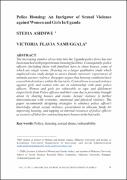| dc.contributor.author | Asiimwe, Stedia | |
| dc.contributor.author | Namuggala, Victoria Flavia | |
| dc.date.accessioned | 2023-03-31T12:30:18Z | |
| dc.date.available | 2023-03-31T12:30:18Z | |
| dc.date.issued | 2020-01 | |
| dc.identifier.citation | Asiimwe, S., & Namuggala, V. F. (2020). Police Housing: An Instigator of Sexual Violence against Women and Girls In Uganda. Journal of Social Development in Africa, 35(1), 79-103. | en_US |
| dc.identifier.uri | https://hdl.handle.net/20.500.12504/1287 | |
| dc.description.abstract | The increasing number of recruits into the Uganda police force has not been matched with proportionate housing facilities. Consequently, police officers (including those with families) have to share houses, some of which are single rooms. Drawing on a larger qualitative study which employed case study design to assess female survivors' experiences of intimate partner violence, this paper argues that housing conditions have exacerbated violence within the barracks. Central to us is sexual violence against girls and women who are in relationship with male police officers. Women and girls are vulnerable to rape and defilement respectively from Police officers and their sons due to proximity brought about by sharing houses and rooms. Sexual violence is further interconnected with economic, emotional and physical violence. The paper recommends designing strategies to enhance police officer's knowledge about sexual violence, government to allocate funds for improving housing, and tapping on internal resources of police officers as a source of laborfor constructing more houses in the barracks. | en_US |
| dc.language.iso | en | en_US |
| dc.publisher | Journal of Social Development in Africa | en_US |
| dc.subject | Police, | en_US |
| dc.subject | Housing, | en_US |
| dc.subject | Sexual abuse, | en_US |
| dc.subject | Vulnerability | en_US |
| dc.title | Police housing: an instigator of sexual violence against women and girls in Uganda | en_US |
| dc.type | Article | en_US |

